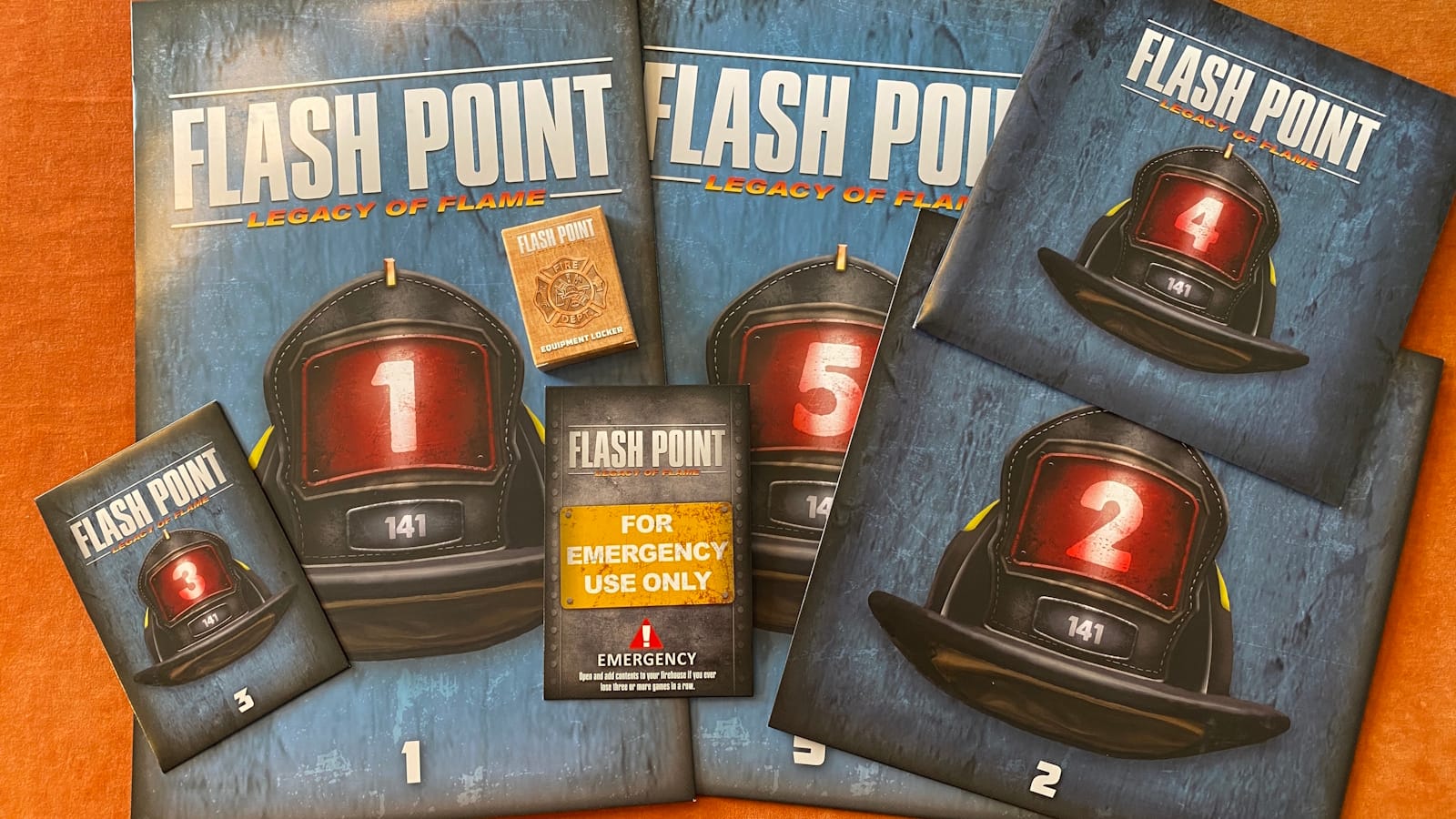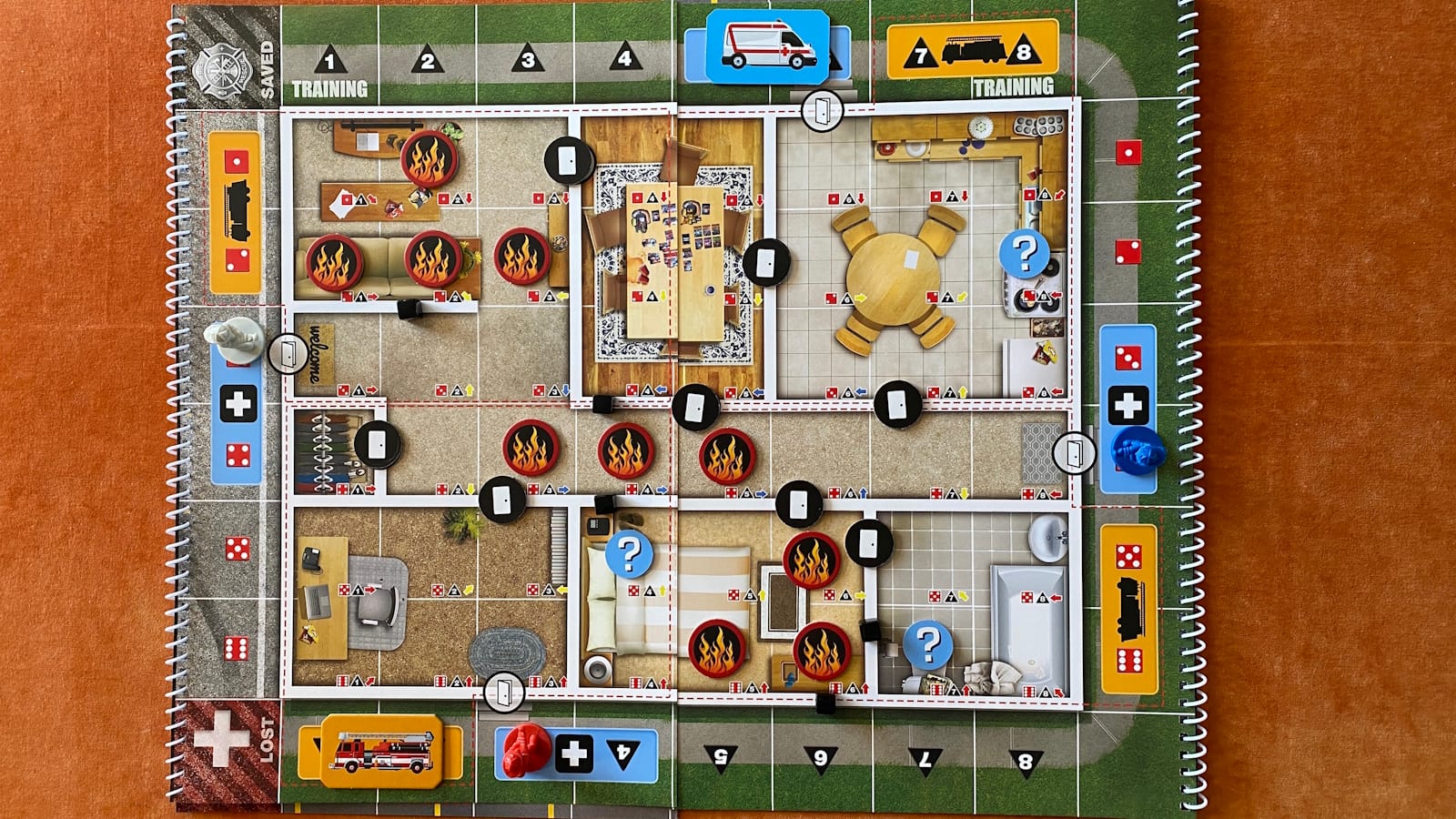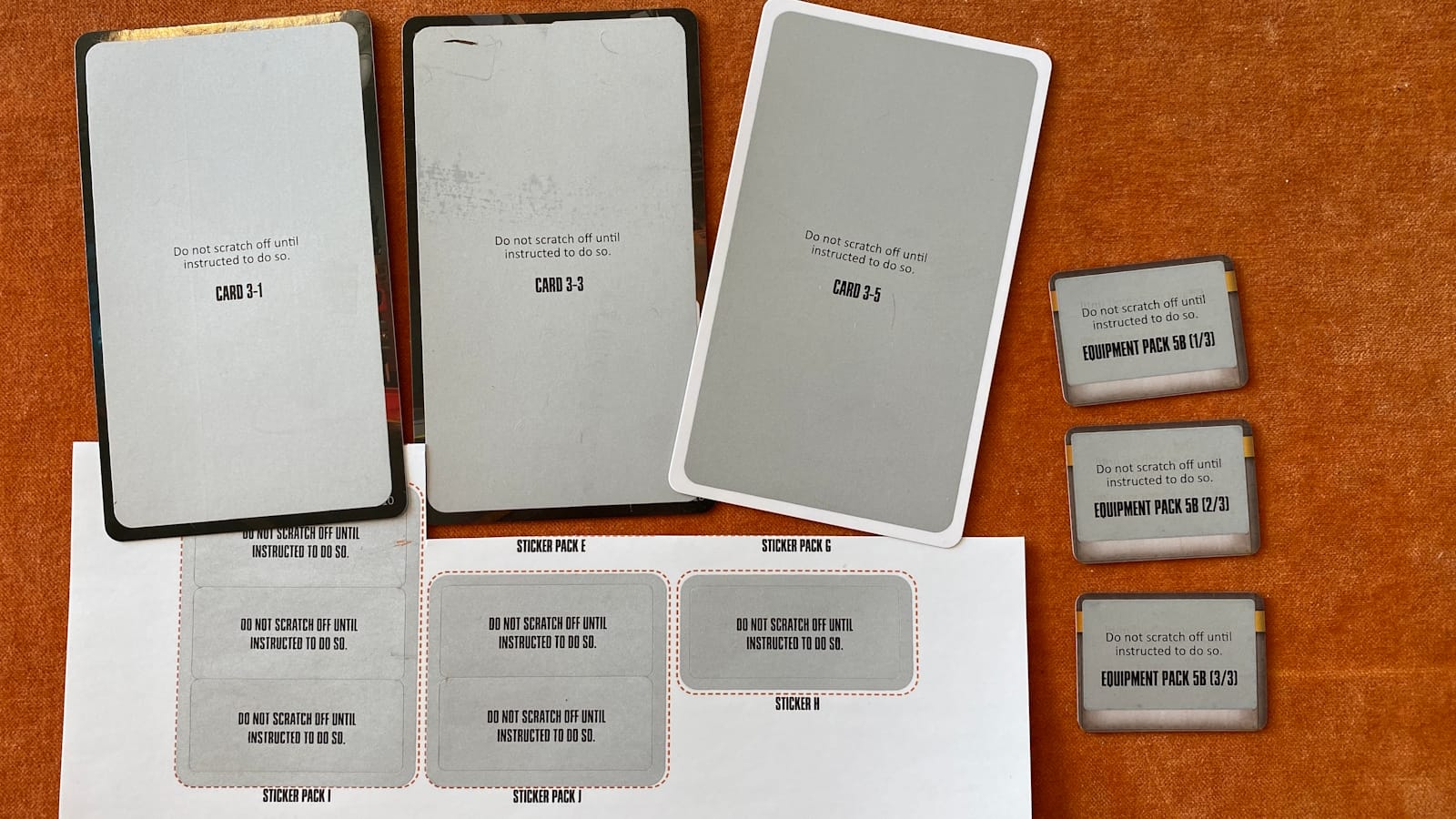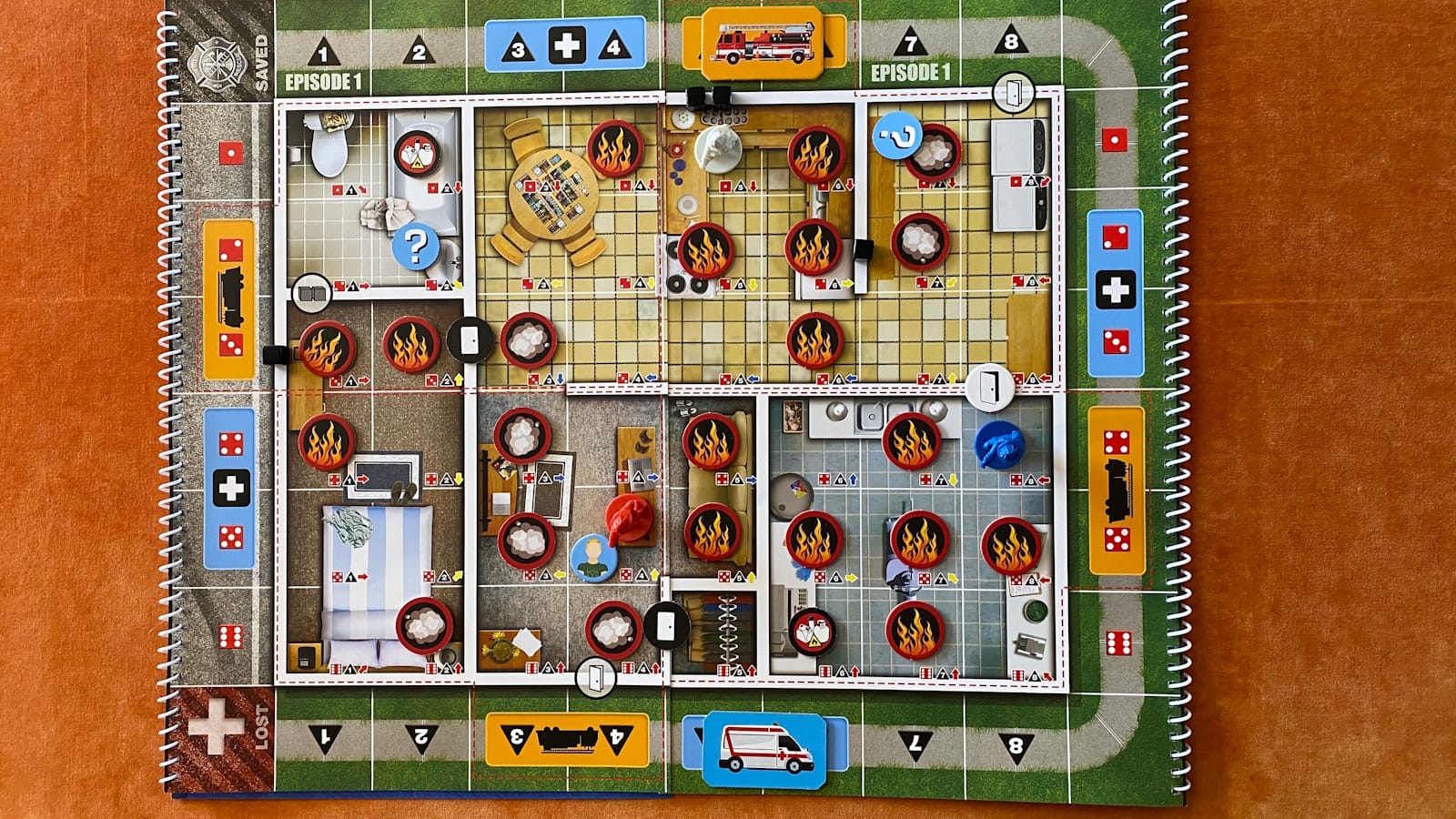Flash Point: Fire Rescue came out almost 15 years ago and remains one of my favorite cooperative games. A bunch of expansions have been released for it, adding new maps and mechanics to make the base game even more interesting. There is a digital version of the base game that I’ve also put over 100 hours in. Flash Point: Legacy of Flame is the latest release in the series, being a standalone legacy version of the base system. I enjoy legacy games, I’ve played every Pandemic Legacy game and enjoyed my experience every time. So with all of my preferences and past experiences I should love this new game, right? No, not so much.

Core System Changes
The basic mechanics of Flash Point involve a team of firefighters attempting to rescue at least 7 of 10 victims from a building while keeping the ever-growing fires under control as best as possible. The board is a 6 by 8 grid with random locations determined by a D6 and a D8 rolled together. After every player has taken their turn, a location is determined for a threat token to appear. If the space is empty then smoke will appear. If there is already smoke, then it turns to fire. If there is already fire, then there is an explosion spreading fire in all directions and damaging walls. Your fire fighters will spend their limited action points running around trying to put out fires, while also searching out points of interest for the victims which need to be dragged back to the ambulance.
In the original game, escalation happened through hotspots on the map where the starting explosions happened. If you ever rolled a hotspot location, you would need to roll again adding another threat and a new hot spot. This meant that over time there would be more and more threats added between player turns. Legacy of Flame does away with hotspots and instead has a fire deck. This deck of cards tells you what to do at the end of your turn, including how many times to roll for threats, when to escalate the deck by adding new cards and reshuffling, and other possibilities. There are also cards to draw events which can mix things up, but I’ll go into those a bit later. I think the new fire deck is a great system. It is a little more controlled than hotspots and has unlimited possibilities on how to make the spread of fire interesting.
While the original game used standard game boards, Legacy of Flame uses scenario books for the maps. I absolutely love this system. It allows for an endless variety of maps with limited space consumption and presumably less cost.

The Legacy Experience
After playing the first scenario, I was having a blast! Flash Point was back with something new; the same core experience but with new maps every game and characters that I get to customize. There’s a little bit of story before the scenarios, but not too much. There’s a bunch of sealed envelopes with secrets just waiting to be discovered. I was ready to immediately dive into the next scenario.
That’s where the troubles began. Legacy games usually have unlocks and changes between sessions. Sometimes by opening an envelope with new cards, applying some stickers permanently to components, or maybe some secret information revealed behind a scratch off. Legacy of Flame managed to make this process unnecessarily tedious by adding scratch off to everything. You open an envelope with cards that are already hidden inside and they are covered with full scratch off. You have to scratch off the entire card, and there are multiple cards unlocked like this between scenarios.
You also unlock stickers to add new skills to your fire fighters. Gameplay wise this is actually a really enjoyable part of the game, growing and customizing your team of firefighters throughout the campaign, but the stickers are all covered with the same metallic scratch off. Okay, sure, if this wasn’t done I could read through all the abilities ahead of time if I really wanted to spoil potential future upgrades, but this system is in no way worth the trade off of more secrecy. And the abilities aren’t really surprises or anything exciting, just minor free actions and such. In addition the stickers are a dull gray after the scratch off is removed, and just doesn’t look as vibrant as a normal sticker would.
Another awkward system is how injuries work. Your firefighters can and will get injured multiple times during the campaign. Each firefighter has two equipment slots. When you’re injured, you put an “injury” sticker over one of the slots preventing you from carrying equipment there. When you heal between scenarios, you put an “equipment” sticker back on top of the injury sticker showing that the slot is available again. Eventually you’ve got this weird stack of stickers on your character card. I feel like there had to be a better way to do this somehow.
I will mention that most of the components are of good quality. All the basic components are the same as in the base game, the card stock is all great, and colored plastic miniatures make it easy to identify each firefighter. The map book is thick card stock, and the rule books are all colorful, organized, and well constructed.

The Story
I enjoy having a story in my games and think it often adds to the immersion. Something I’ve liked about the Flash Point games is a somewhat grounded sense of realism. You’re firefighters doing your job trying to put out fires while saving people. Without spoiling too much, the story in Legacy of Flame is fantasy. There’s a crime/mystery drama going on and you’re caught in the middle. None of the fires you go to put out are standard house fires but part of some larger plot. Intermixed in every scenario is a whacky scientist and his goofy contraptions providing you with some sci-fi equipment to use in your games. If you’re into that sort of thing, then perhaps you’ll love this, but I was expecting a story about firefighters.
Another disappointment is the lack of actual impact on the story. You can win or lose scenarios, rescue or fail to rescue story characters, and it doesn’t matter. If they were meant to live or die, they will do so regardless of how you did in that scenario. The story moves on in one direction with one outcome no matter what. Being a legacy game, I would have appreciated having my decisions and actions actually impact the outcome of the campaign.
Evolving Gameplay
I have mixed opinions on some of the systems added throughout the campaign. New maps in every game are absolutely great, adding to and evolving the fire deck is great and unique events and scenario special rules all add a ton of welcomed variety. However, some of them are not implemented very well.
Let me start by saying that Flash Point, at its core, is a game about controlling chaos. There is a lot of tension and exciting decision making surrounding action efficiency and risk taking. There is randomness galore as every new threat token and point of interest is added randomly to a 48 space grid, but there is an important evolution of threat from smoke to fire to explosion. If there is a large area on fire, there is a very high likelihood of continuing explosions in that area that will eventually bring the building down. So you send your best extinguisher over there to tame it as much as possible while your fastest character hunts down POIs looking for victims to rescue. If there is a bunch of smoke building up in the far corner of the building, you have to make tough decisions on what to prioritize. A key component is that you almost always have an opportunity to react to an upcoming threat. If an unlucky roll puts some smoke on one of your characters when it isn’t their turn, you can either risk that it won’t become fire before they can move, or you can send someone else over there to deal with it.
Early on in the campaign a mechanic is added that breaks this. Without spoiling too much, new cards are added to the fire deck that, when drawn, cause a target roll. If you roll the location of one of your fire fighters then they get injured. They are sent to the ambulance and any victim they are carrying is lost with no warning or ability to save them before it happens, it is immediate. There is a piece of equipment that you could wear to save you from this once, but it takes the spot of equipment that could actually be used to try and fight fires and save victims. Sometimes multiple threats appear in a single turn and it is possible to roll the same location twice in a row where a firefighter or victim is. That is incredibly bad luck. There is a lot of randomness in this game which needs to be embraced, but a 2 - 6 chance every time these cards come up (however many firefighters are on the board) to just get knocked out is not fun. I found it frustrating and it happened to me multiple times. This mechanic was single handedly ruining my enjoyment of the game.
Mixed in with the fire cards are also triggers that have you draw from an event deck. This deck is unique for every scenario, which is cool. They are in a specific order and thematic. They also act as a timer of sorts, as once you reach the bottom all future events trigger the same last card, which is usually really bad. However, since you don’t know what events are coming they can feel random and sometimes devastating. I had a scenario where a smoke appeared right on one of my firefighters. Uh oh, scary and exciting, I better do something to save them! And then the event immediately turned all smoke into fire, knocking them out. As mentioned before, that sort of instant random punishment is not enjoyable.
One particularly egregious scenario had a bunch of special setup and rules, taking a good amount of extra time to prepare. Normally you have 10 possible victims and 4 need to be lost before you fail the scenario. This one had only 3 victims of which you need to save 2 of them. Given that this is a game of randomness, sometimes bad luck happens, but in this case I had early bad luck that caused me to lose 2 of the victims within the first 2 rounds, which meant that I lost the scenario in less time than it took to set it up. That wasn’t an enjoyable experience.

Conclusion
Flash Point: Fire Rescue is a game about trying to control a randomly spreading fire while pushing towards your goal of rescuing 7 victims. It’s chaos and it’s often difficult with good luck and bad luck. Sometimes it all falls apart and you lose the game, but that’s fine. Set it back up and try again with new characters and strategies. Legacy of Flame takes that and puts it into a campaign where there is no trying again. You can get commendations at the end of a scenario based on how well you did, but most of that is just how lucky you got. I love the Flash Point system, but I don’t think legacy is a great format for it. Add to that all the needless tedium between scenarios and it is very difficult for me to recommend this game.
If you enjoy cooperative gaming and have never played a Flash Point game, you absolutely should, but not this one. Get the original Flash Point: Fire Rescue and play that. You can add expansions when you want more content. It’s also a lot cheaper than this version. If you already love Flash Point, really love legacy games, and are willing to put up with the issues I’ve mentioned, then there is a lot of variety to be had in this box. But you’ll only be able to go through the experience one time, which is also a bummer.
I will mention that, as of this writing, there is a new Flash Point game coming that might be a happy medium between Legacy of Flame and the original. Flash Point: Golden State Heroes will be a standalone game with 6 connected scenarios (half of what Legacy of Flame has) but without any legacy elements. It has character customization and equipment, which are some of the best aspects here, and it is also fully replayable.
Flash Point: Legacy of Flame
Good
Flash Point: Legacy of Flame takes an amazing cooperative game system and smothers it in legacy elements, not always for the better. Great variety and updated systems mixed with many potential frustrations. Recommended only for the true legacy enthusiasts.
Pros
- Lots of maps and scenario variety
- New fire and event decks are great additions to the system
- Customizing firefighters throughout the campaign is fun
Cons
- Absurd amount of unnecessary scratch off required between games
- Some frustrating overly luck based mechanics added
This review is based on a retail copy provided by the publisher.
















